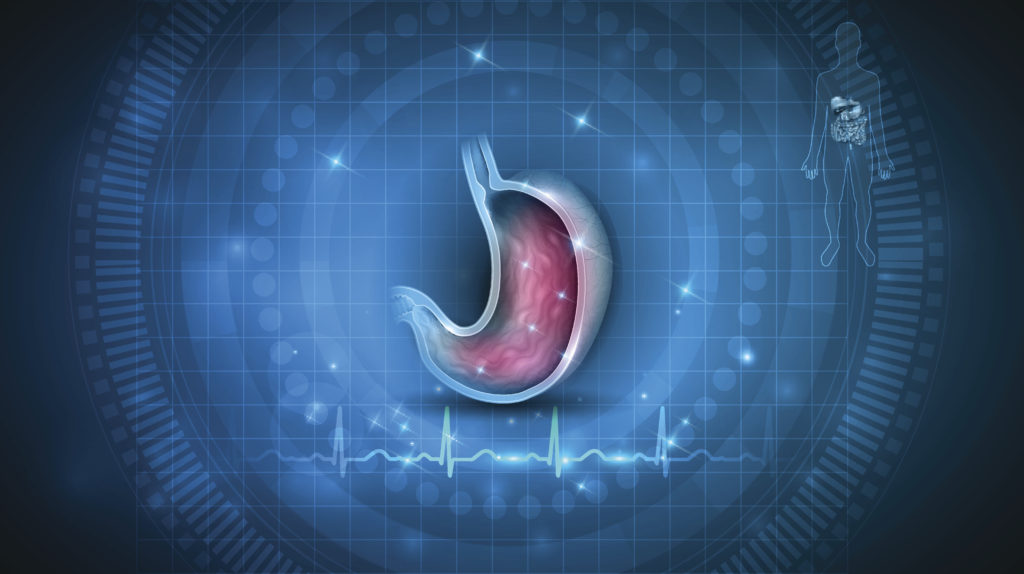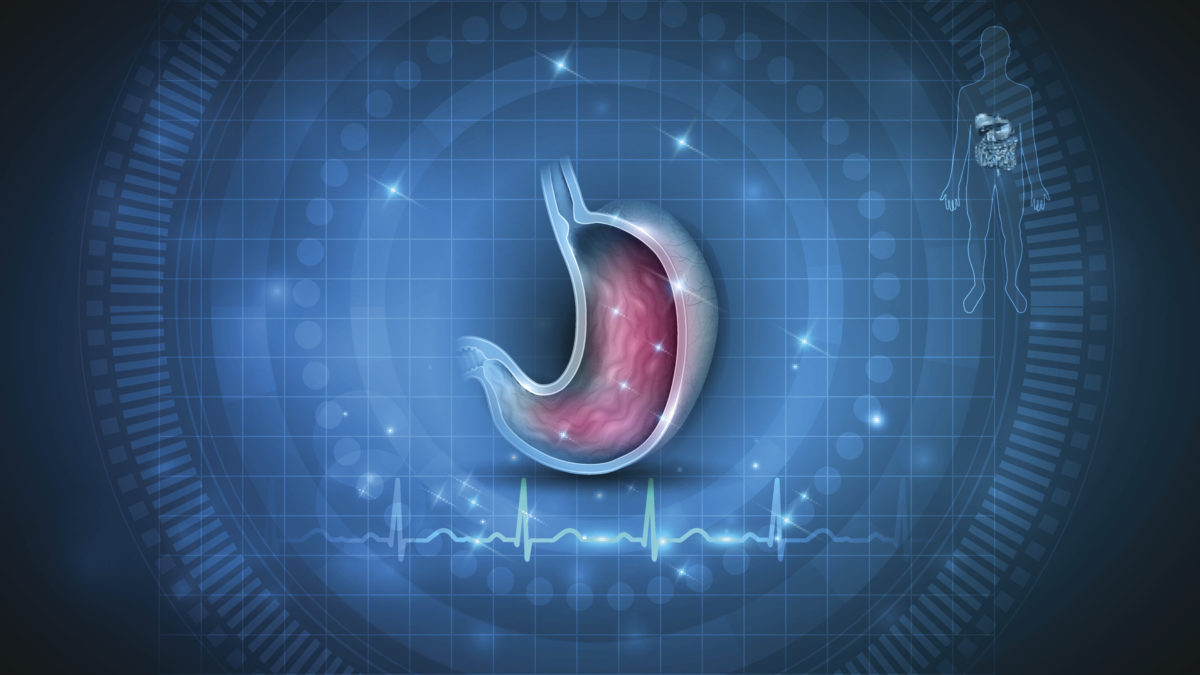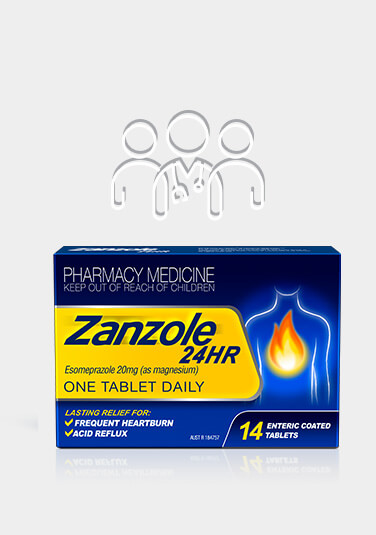
Heartburn
June 14, 2020On this page:
- A bit about heartburn
- Over-the-counter heartburn medications
- What is esomeprazole and how does it work?
- Who should use esomeprazole?
- When to see your doctor

Keep getting that burning feeling in your chest? Then it may be time to find out a little more about heartburn medications, such as esomeprazole, that can help relieve frequent heartburn.
A bit about heartburn
We all occasionally get heartburn — that uncomfortable rising feeling behind your breastbone — often brought on by eating a big meal, exercising after eating, being anxious or during the advanced stages of pregnancy.
Having frequent heartburn (two or more times a week) or troublesome symptoms severe enough to affect your daily life are typical features of gastro-oesophageal reflux disease (GORD) or acid reflux for short.
The pain and discomfort of heartburn is caused by acid escaping from the stomach and flowing back up the oesophagus (the tube that connects your throat to your stomach).
Over-the-counter heartburn medications
There are a range of treatments that may help relieve your heartburn. Your pharmacist or doctor are a good source of information; they can advise you on the different types of over-the-counter and prescription medicines available and, depending on the frequency and severity of your symptoms, which may best suit your heartburn.
Heartburn medications work in different ways — there are those that neutralise stomach acid or form a protective barrier in the stomach, and those that reduce the amount of acid the stomach makes.
Over-the-counter heartburn medications include:
- Antacids — these neutralise the effects of your stomach acid, work rapidly but are usually only effective for a short time (about 30–40 minutes) and are suitable for when you get mild or occasional heartburn
- Alginates — form a floating raft on top of your stomach contents that provides a barrier to help protect the stomach and oesophagus from the effects of rising stomach acid. Alginates are often combined with antacids to help provide longer-lasting relief (up to 4 hours) than antacids alone.
- H2-receptor antagonists (H2RAs or H2 blockers) — work by reducing the amount of acid made by the cells in the lining of the stomach. Onset of relief is approximately 60 minutes and can last for a few hours, making them useful for occasional heartburn
- Proton pump inhibitors (PPIs) — these are very effective acid suppressors with long-lasting effects (around 2 days), but it can take 2–3 days before the full effects are reached. PPIs are used to treat frequent heartburn.
What is esomeprazole and how does it work?
Esomeprazole — the active ingredient in Zanzole 24HR — is a proton pump inhibitor.
Stomach acid is produced by a ‘proton pump’ (the hydrogen-potassium-ATPase enzyme system). As their name suggests, PPIs act on this pump to reduce the amount of acid being produced in the stomach. This helps relieve heartburn symptoms – but does not stop the normal digestion of food.
Who should use esomeprazole?
Esomeprazole is suited to people who get heartburn two or more times a week. It can start to suppress acid within a few hours but will not give instant relief from heartburn symptoms and you may need to take it for a few days before feeling the full benefits.
Before taking esomeprazole it is important to first check with your pharmacist or doctor to see if it is okay for you to use — this is particularly important if you:
- Are pregnant or breast-feeding
- Have liver or kidney problems, or any other medical conditions
- Have difficulty swallowing, have lost lots of weight or have dark tarry stools
- Are allergic to any medications or any other things such as foods, dyes or preservatives
- Are taking other medicines or supplements (they can interfere with how esomeprazole works and vice versa).
It is always a good idea to learn more about your medications before taking them.
Zanzole 24HR has its own Consumer Medicines Information (CMI) leaflet that contains information to help answer common questions you may have, such as how to take the medication, what to do if you miss a dose, things you should think about before taking it and any potential side effects.
It’s important that you don’t chew Zanzole 24HR tablets before swallowing them. PPIs are unstable in acidic conditions and the tablets are covered in an enteric coating to prevent them from dissolving until after they pass through your stomach— so don’t crush or chew the tablets otherwise they won’t work properly! If you have difficulty swallowing tablets ask your pharmacist to explain the best way to take Zanzole 24HR or check the CMI for instructions.
Zanzole 24HR only needs to be taken once a day (with food or on an empty stomach) — so it’s a good idea to set a regular time to take it each day. If you forget to take your Zanzole 24HR tablet at your normal time — don’t take a double dose to make up for the missed dose — just take it when you remember and then go back to your normal routine time (unless it’s almost time to take it again, then just skip the missed dose).
When to see your doctor
Heartburn is a common problem – most people get it from time to time. However, if you suffer from frequent heartburn (two or more times a week) it could be a sign of GORD and may require further investigation and treatment by your doctor.
You should also see your doctor when over-the-counter medications, such as Zanzole 24HR, aren’t
working for you. If you’re taking Zanzole 24HR and your symptoms don’t improve after 2 weeks, talk to a doctor.
All medicines have side effects — sometimes they are serious but most of the time they are not. It’s important to tell your doctor or pharmacist if you feel unwell while taking Zanzole 24HR. Difficulty swallowing, persistent vomiting and unexplained weight loss can be potential problems that your doctor should know about immediately. You should also see your doctor immediately if you get pain or indigestion while taking Zanzole 24HR, vomit blood or food, or pass black (bloodstained) stools.
If you notice any of the following serious side effects, tell your doctor immediately or go to Accident and Emergency at your nearest hospital:
- Liver problems (often seen as yellowing of your skin or the whites of your eyes, feeling generally unwell, nausea, vomiting, loss of appetite) Shortness of breath, wheezing or difficulty breathing
- Swelling of the face, lips, tongue or other parts of the body
- Severe skin reactions (including rashes, itching, redness, blistering or peeling of the skin).
THIS INFORMATION IS NOT INTENDED TO DIAGNOSE HEALTH PROBLEMS OR REPLACE THE ADVICE OF A HEALTHCARE PROFESSIONAL.





